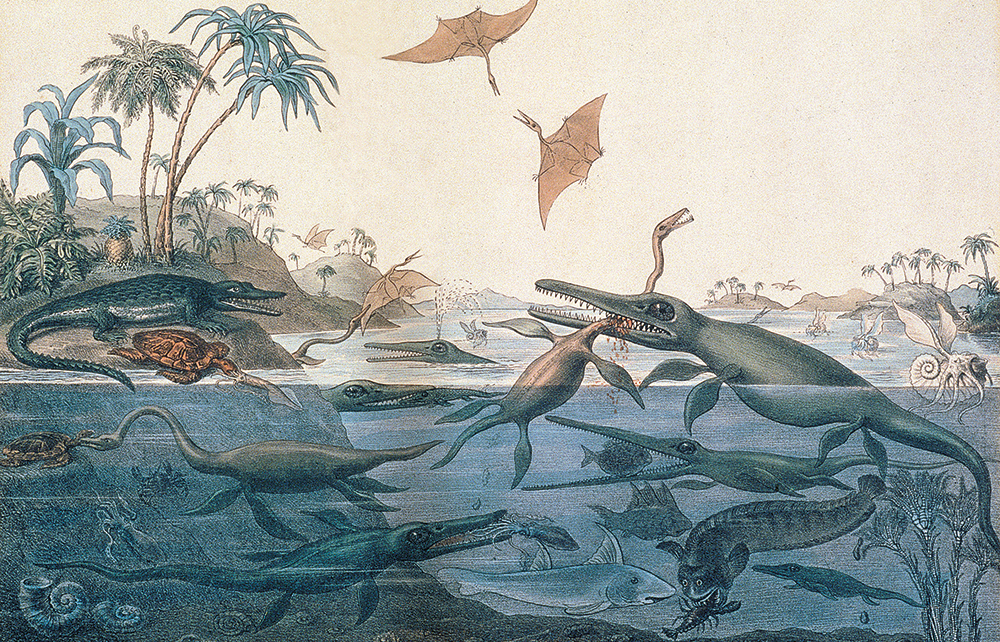In March 1860, shortly after The Origin of Species was published, Charles Darwin wrote to Leonard Horner thanking him for some surprising information. ‘How curious about the Bible!’ he exclaimed. Horner had taken aim at the marginal notes that were printed in the standard (and ubiquitous) Authorised, or King James, Version. These began with the date of creation, 4004 BC, as calculated by Archbishop James Ussher in the 17th century. Darwin was astonished. ‘I had fancied that the date was somehow in the Bible,’ he wrote.
The disturbing ‘monsters’ dug from the cliffs of Lyme Regis did not sit well with the literal reading of Genesis
The fact that Darwin, who had trained to be clergyman, did not know that Ussher’s dating system was an early modern imposition on the text gives some indication of the hold it had on the British mind in the early 19th century. That hold was first broken by dinosaurs or, more precisely, by the fossils that Mary Anning and her family dug from the soft cliffs around Lyme Regis in the 1810s, which is where Michael Taylor’s eminently readable and well-researched book begins.
Larger than and unlike any known living creatures, these disturbing ‘monsters’ did not sit well with a literal reading of Genesis. They could not have drowned in the Flood because God had preserved all living creatures on the Ark (plus many looked rather like fish). They were also buried very deep. The idea of an ancient world had long been discussed in fashionable European salons. Fossils now seemed to add weight to these speculations.
Taylor traces the story from Anning’s first discoveries, through William Buckland’s establishment of geology as a discipline respectable enough even for stuffy Oxford, and Darwin’s epochal voyage, to the globalisation of palaeontology and the widespread acceptance of evolution within a generation of The Origin’s first publication. He writes well, knows his subject and has a fine eye for detail. He is especially good on the ‘gorilla war’ between Richard Owen – pre-eminent anatomist, coiner of the word ‘dinosaur’ and opponent of evolution – and Thomas Huxley, self-made scientist, intellectual pugilist and Darwinian crusader. Taylor nails the deep tension between the two men, with Huxley determined to ‘segregate scientific enquiry from issues of religion or belief’ while Owen ‘spewed venom at the radical researchers who would carry off his science into secular terrain’.
All of which makes it frustrating that he (or perhaps his publisher) has chosen to frame the entire story around the hackneyed ‘war between science and religion’. You suspect Taylor knows this doesn’t quite add up. ‘Historians have long sought to present a more nuanced assessment of the subject,’ he writes in his preface, approvingly referencing a recent volume with contributions from 17 scholars discrediting the idea. ‘The first generation of British geologists had been devout Christians, all of them,’ he acknowledges later in the text.
True, clergymen in the 1820s had to accommodate geology to theology, whereas those in the 1880s did the opposite. But reading the book, one struggles to find anyone who actually lost their faith on account of geology or evolution. George Cuvier, Mary Anning, William Buckland, William Conybeare, Charles Lyell and William Thomson all modified their beliefs but remained devout while pioneering their relevant fields. Those who did reject Christianity (Darwin), or take up arms against it (Huxley), tended to do so for personal rather than scientific reasons. Ussher’s dating system was clung to at first but soon renegotiated and then easily jettisoned (the systemic fundamentalist rejection of an old Earth was a 20th-century phenomenon). Many of the arguments were actually internal to the science itself, geology, palaeontology and biology all being nascent and highly contestable disciplines. Ultimately, biblical criticism, anti-clericalism and increased moral sensitivity to the idea of hell were far more responsible for the famed Victorian crisis of faith than dinosaurs or even science ever were.
In as far as there was a war here it was, as Taylor himself says, a ‘culture war’, concerning intellectual and public authority, once accorded by right to old-school clerical naturalists, and now sought by new-fangled ‘scientists’. In this, the latter were decisively victorious. The country that buried Darwin in 1882 was hardly less religious than the one that first dug out fossils 70 years earlier, but its science was. In the 30 or so years before the famous Oxford debate between Huxley and Bishop Wilberforce in 1860, nearly 40 Anglican clergy had presided over the various sections of the British Association for the Advancement of Science. In the 30 or so years after, three did. Dinosaurs weren’t exclusively responsible for the secularisation of science in Britain, but they were certainly powerful allies in this worthy cause.






Comments